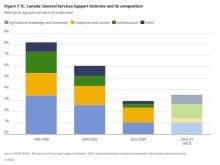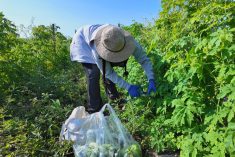The federal government’s next budget could have a significant impact on the future of Canadian agriculture.
It’s worth paying attention to.
Canadians didn’t get a 2020 budget: it was an early casualty of COVID-19, cancelled in the pandemic’s infancy.
Read Also

Women who fed a nation
More than 40,000 young women supported the war effort between the 1940s and early 1950s, helping grow and harvest crops amid labour shortages. They were called Farmerettes.
Instead we were offered economic updates and a series of spending announcements, almost entirely COVID-19 related.
This year, the governing Liberals will release a 2021 budget. Under normal circumstances, budgets are typically unveiled sometime in March.
There is no set date for this year’s budget, but consultations are taking place that will help inform what the document looks like.
A recently released, pre-budget consultation report from the House of Commons finance committee recommends several measures directly related to agriculture.
Members of Parliament say the government should create and fund a new AgriResilience program, “to help farmers transition to lower-carbon agriculture practices, thereby reducing the growing climate risk in this sector. An AgriResilience program would reward innovation and the adoption of new, more resilient farming practices, thereby helping to reduce climate risk.”
Creating such a program has been championed by the Quebec-based Équiterre, a non-profit organization responsible for submitting a report to the Agriculture and Agri-Food committee last summer called, “Toward the Creation of an AgriResilience Program.”
The report proposed “creating a new business risk management program called AgriResilience that will stimulate innovation, reduce the impact of climate risk on agricultural production and revenue, and mitigate the inherent risks associated with the transition toward new farming practices.”
Équiterre manages a community-supported agriculture network in Quebec, and is fairly well-known in that province for its environmental activism.
There is a direct tie between the governing Liberals and Équiterre: one of its founders, Steven Guilbeault, serves as the Minister of Canadian Heritage in the federal cabinet.
I don’t know how much influence the Heritage Minister has on the Finance Minister’s budget plans for the Minister of Agriculture and Agri-Food, but it’s a connection worth noting.
Creating such a program would also run parallel with the Liberal’s broad-based, so-called green policy agenda that is expected to influence budget decisions.
There is already some funding from the government supporting efforts in agriculture to mitigate or be resilient against climate change.
For example, there is the Agricultural Greenhouse Gases Program, which for several years was tasked with financially supporting “projects that will create technologies, practices and processes that can be adopted by farmers to mitigate greenhouse gas (GHG) emissions.”
The program is scheduled to end this year.
The Living Labs Initiative, launched in 2019, is a “new approach to agricultural innovation in Canada, that brings together farmers, scientists, and other collaborators to co-develop and test innovative practices and technologies to address agri-environmental issues.”
On the simple surface, the creation of an AgriResilience program looks to be fairly symbiotic with these policy initiatives.
It would also significantly shake up the face of business risk management offerings in Canada.
Adding such a program to the roster of business risk management programs offered may be welcomed by producers, but it’s not the change they are looking for.
The finance committee’s report was done after consultations with hundreds of groups — dozens of them with ties to agriculture and agri-food.
Members of that multi-partisan committee must have recognized the significance of the long-held desire of producers to see the reference margin for AgriStability raised to 85 per cent of reference margins.
It is the first agriculture-related recommendation the committee makes.
There is also a call for the creation of an agri-food specific labour action plan, another measure many within the industry have called for.
Whether any of these, or other recommendations make it into the budget is anybody’s guess, but Canada’s 2021 spending plans are definitely worth paying attention to.















